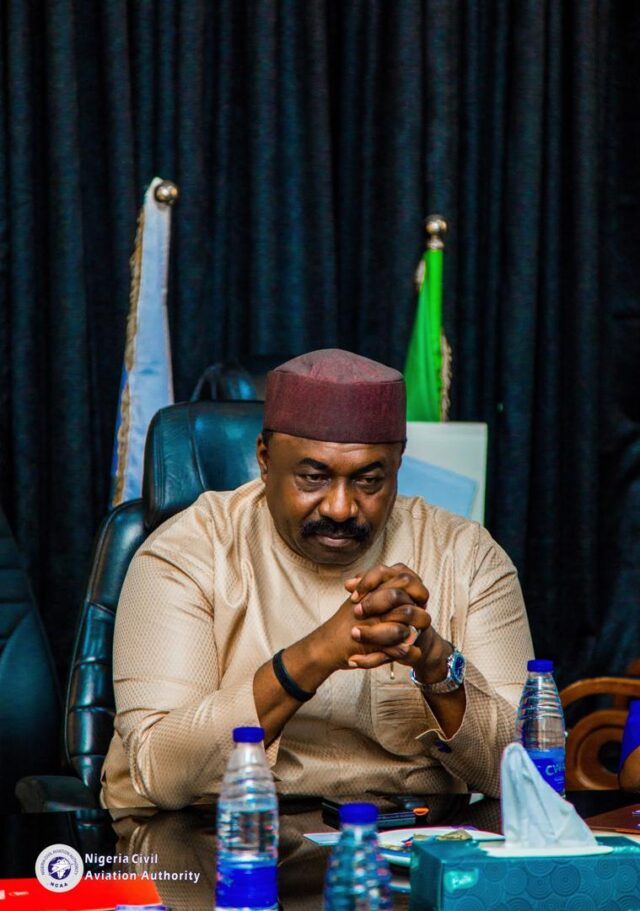Director General of the Nigeria Civil Aviation Authority (NCAA), Captain Chris Najomo, has firmly rebutted Senator Orji Uzor Kalu’s recent comments on alleged pilot substance abuse and lapses in NCAA’s oversight, describing them as “misleading and unfounded.”
Reacting to the Senator’s remarks, Captain Najomo said the Authority was compelled to clarify the facts in the public interest. He stressed that Nigeria’s aviation sector remains “one of the most regulated and medically scrutinized in Africa.”
“We hold the Distinguished Senator and the National Assembly in the highest esteem,” Captain Najomo stated. “However, it is important to clarify that the NCAA operates a rigorous, internationally recognized system for certifying and monitoring the professional and medical fitness of all pilots operating in Nigeria.”
Strict Medical Oversight and Substance Abuse Testing
Najomo explained that no pilot is permitted to operate a Nigerian-registered aircraft without both a valid licence and a current medical certificate, as mandated by Nigeria Civil Aviation Regulations (Nig. CARs) Part 8.4.1.4.
“Every commercial and airline transport pilot must hold a valid Class 1 Medical Certificate,” he said. “These are issued only after comprehensive aero-medical evaluations by NCAA Authorized Aviation Medical Examiners and approved by our in-house assessors.”
According to the DG-CA, these evaluations are extensive and continuous, covering cardiovascular, neurological, respiratory, visual, and psychological assessments to ensure pilots are physically and mentally fit.
“Nig. CARs Part 2.11.2.6(b) defines the physical and mental standards for certification,” he noted. “Any condition that could incapacitate a pilot or indicate psychoactive substance use/(abuse) automatically disqualifies the applicant.”
He added that medical certificates remain valid for 12 months for pilots under 40 and six months for those aged 40 and above. Upon expiry, they must undergo new examinations before renewal.
“This renewal process keeps every pilot within the highest threshold of alertness and medical fitness,” Najomo explained.
Addressing the Senator’s specific claim on substance misuse, Najomo referenced Nig. CARs Part 8.5.1.5, which prohibits any crew member from acting as flight crew within eight hours of alcohol consumption or while using psychoactive substances.
“Our regulations are clear no flight crew member may operate under the influence of alcohol or drugs,” he said. “We conduct random and unannounced drug and alcohol tests, including on-the-spot checks where there is reasonable suspicion. Violations for these substance abuse attract immediate sanctions.”
He emphasized that the results of such substance abuse tests are admissible as legal evidence, reinforcing NCAA’s zero-tolerance policy toward substance abuse in aviation operations.
Daily Ramp Inspections and Enforcement
Najomo further noted that NCAA’s safety oversight extends beyond medical checks to daily ramp inspections at airports nationwide. Inspectors routinely verify crew licences, medical certificates, and overall fitness for duty.
“Our inspectors are on the ramp every day,” he said. “They ensure compliance with licensing and medical standards. Any irregularity is addressed immediately, and offenders face strict enforcement action.”
Najomo cited a recent case in August 2025, where the NCAA suspended a ValueJet pilot for initiating departure procedures without proper clearance.
“That case shows our uncompromising stance on safety and discipline,” he stated. “We will never tolerate conduct that undermines public confidence in aviation safety.”
While acknowledging the Senator’s concerns, Najomo said they were based on incorrect assumptions and did not reflect the true regulatory environment in Nigeria.
“We appreciate the Senator’s concern for public safety,” he remarked. “However, the assertions do not align with actual regulatory practice. NCAA operates in full compliance with International Civil Aviation Organization (ICAO) standards and continues to achieve strong ratings in international safety audits.”
He reiterated that the Authority remains open to collaboration with lawmakers and stakeholders to enhance safety and transparency.
“Our doors are always open for constructive dialogue,” Najomo said. “We invite the Distinguished Senator and his colleagues to visit our facilities, observe our oversight processes, and see firsthand how we maintain Nigeria’s high safety record.”
Reaffirming NCAA’s dedication, Captain Najomo assured that the safety of air transport operations in Nigeria remains uncompromised.
“We want to assure the flying public that Nigerian skies remain safe,” he concluded. “Our medical checks on substance abuse are uncompromising, our enforcement is swift, and our oversight system is globally respected. NCAA will continue to guard against any form of substance abuse that threatens flight safety.”
























